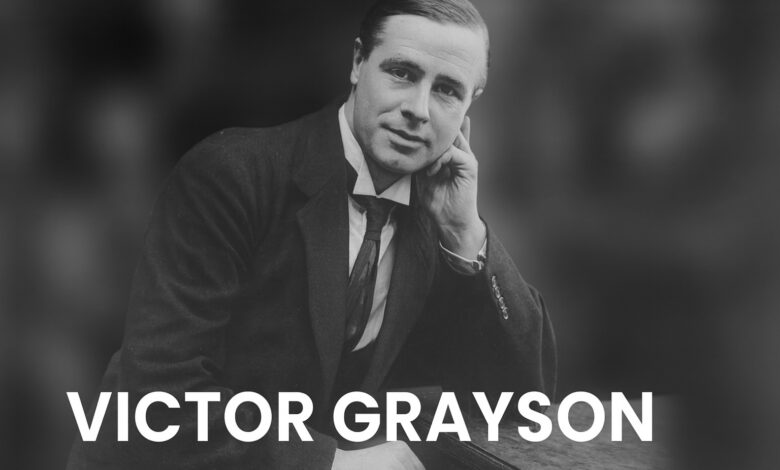Victor Grayson: The Radical Voice Who Rose to Power and Vanished Without a Trace
The Inspiring Rise and Mysterious Fall of a Fearless Socialist Trailblazer

Introduction
Victor Grayson, a bold and fiery socialist, shook British politics in the early 20th century with his electrifying speeches and working-class defiance. Yet, just as quickly as he rose, he disappeared—leaving behind one of the greatest political mysteries in British history. From humble roots in Liverpool to a commanding presence in Parliament, Grayson’s story is filled with courage, controversy, and unanswered questions.
His journey reveals both the power of passion and the peril of standing alone against powerful interests. With no confirmed death, no body, and only speculation surrounding his fate, Victor Grayson remains a symbol of both inspiration and political intrigue.
Quick Bio
| Field | Details |
|---|---|
| Full Name | Albert Victor Grayson |
| Date of Birth | 5 September 1881 |
| Birthplace | Liverpool, England |
| Nationality | British |
| Ethnicity | English-Scottish |
| Accent | Northern English / Scouse |
| Education | Owens College (Unitarian theology) |
| Career Start | Engineer Apprentice, ILP Speaker |
| Major Role | MP for Colne Valley (1907–1910) |
| Wife | Ruth Nightingale |
| Children | One daughter |
| Known For | Socialist oratory, political mystery |
| Disappearance Date | 28 September 1920 |
| Net Worth | Modest (bankrupt in 1914) |
| Legacy | Radical icon, unsolved disappearance |
Born in the working-class district of Liverpool, Albert Victor Grayson came from humble beginnings. His father was a shipyard carpenter and his mother of Scottish descent, giving him a blend of English and Scottish heritage. He struggled with a stammer as a child but was determined to rise above his circumstances.
Grayson left school early and began training as an engineer in Bootle. However, he was drawn to public speaking and theology, later enrolling at Owens College to train as a Unitarian minister. His time in Manchester, surrounded by socialists and activists, shifted his attention to politics.
Political Awakening and Ideological Passion
Grayson’s interest in socialism deepened in the early 1900s when he joined the Independent Labour Party (ILP). He quickly became known as a mesmerizing speaker, addressing rallies across the North of England. His speeches attracted large crowds who were drawn to his energy, charisma, and unwavering commitment to workers’ rights.
By his mid-20s, Grayson had earned a reputation as a powerful advocate for social justice. Despite not being officially endorsed by the Labour Party, he stood independently in the 1907 Colne Valley by-election and won—a moment that stunned the political establishment and showcased his wide grassroots appeal.
Member of Parliament and Fiery Impact
At just 25 years old, Victor Grayson entered Parliament and immediately set himself apart. He refused to take the Labour Party whip, asserting his independence and attacking what he saw as their betrayal of the working class. His fierce rhetoric earned both admiration and scorn from fellow MPs.
He famously told Labour members they were “traitors to your class” during a fiery speech in the House of Commons, earning him suspension. Grayson’s time in Parliament was short but impactful. He introduced bold ideas, championed the poor, and exposed the complacency of party elites.
Decline, War, and Tragedy
Grayson lost his seat in the January 1910 general election and failed to regain political footing afterward. His personal life also spiraled—he fell into debt, battled alcoholism, and became estranged from political allies. In 1912, he married actress Ruth Nightingale, and they had a daughter, but Ruth tragically died during childbirth in 1918.
During World War I, Grayson supported Britain’s involvement and served with the New Zealand Army, sustaining injuries at Passchendaele. Post-war, he resumed lecturing but never regained his former political influence.
The Honours Scandal and Vanishing Act
By 1919, Victor Grayson claimed he had evidence of corrupt “cash-for-honours” deals involving Prime Minister David Lloyd George and Maundy Gregory, a shadowy political fixer. Grayson publicly threatened to expose them and mocked Gregory as a “monocled dandy” linked to bribery and secrecy.
In September 1920, Grayson was assaulted in London—suffering a broken arm and head injury. Shortly after, he was seen entering a building in Piccadilly and never reappeared. No body was found. He was not even reported missing for months, and speculation about his fate took root across Britain.
Theories Behind the Disappearance
Several theories emerged to explain Grayson’s disappearance. Some believed he was murdered to silence his exposure of political corruption. Others speculated he faked his death to escape scandal, possibly living under a new identity in New Zealand or elsewhere.
No theory has ever been proven. Official investigations yielded no conclusive results, and to this day, Victor Grayson’s disappearance remains one of Britain’s most perplexing mysteries.
Legacy of a Lost Revolutionary
Victor Grayson’s impact on British politics outlasted his brief time in office. His radical spirit and unfiltered honesty inspired generations of socialists and working-class activists. Though the Labour Party grew more moderate over time, Grayson is remembered as a “what if” figure—the man who could have led a more revolutionary Labour movement.
He challenged complacency, spoke truth to power, and embodied both the promise and peril of political dissent. Books, plays, and articles continue to explore his life and disappearance, cementing his role as a legendary figure in British history.
Conclusion
Victor Grayson’s life is a powerful blend of brilliance, rebellion, and mystery. From poverty in Liverpool to a seat in Parliament and sudden disappearance, his story captivates not just because of its unresolved end, but because of the passion he poured into everything he did. He was a voice for the voiceless, a challenger of the elite, and a reminder that standing up for truth often comes at great personal cost. Whether he was silenced by enemies or chose to walk away from the spotlight, Victor Grayson’s legacy endures.
Frequently Asked Questions
Who was Victor Grayson?
Victor Grayson was a British socialist politician who won a seat in Parliament in 1907 as an Independent Labour candidate and disappeared mysteriously in 1920.
What caused Victor Grayson’s disappearance?
Theories include political assassination, voluntary disappearance, or accidental death. He was last seen entering a building in Piccadilly.
What was Victor Grayson known for?
He was known for his passionate oratory, socialist ideals, and for exposing political corruption involving honours scandals.
Did Victor Grayson have any children?
Yes, he had one daughter with his wife, Ruth Nightingale, who passed away in 1918.
What is Victor Grayson’s legacy today?
Grayson is remembered as a radical icon, a potential leader of a more revolutionary Labour movement, and
the center of one of British politics’ greatest unsolved mysteries




